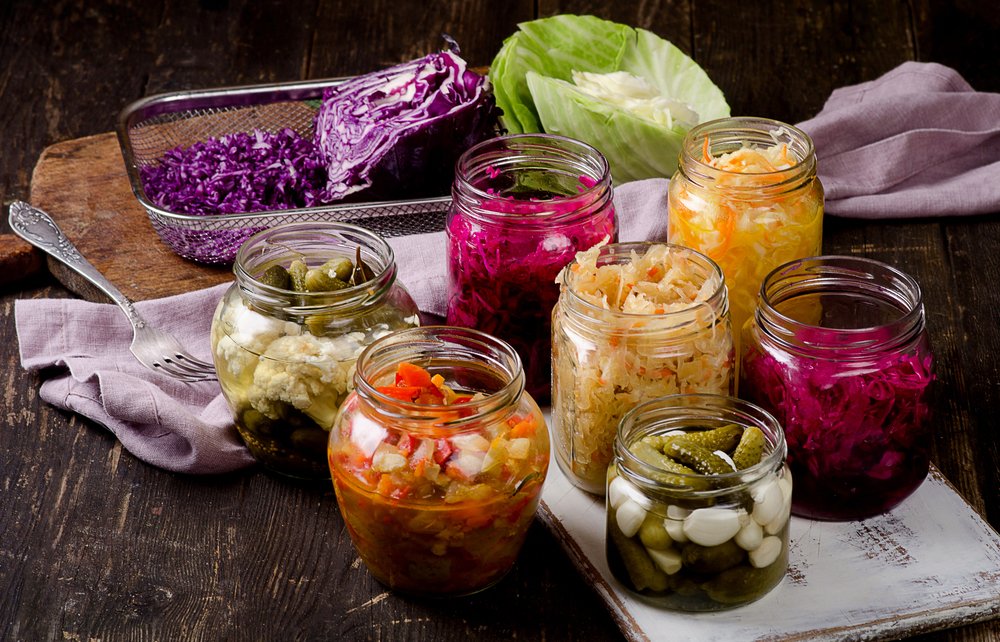Increasing numbers of us are suffering with gut issues such as bloating and Irritable Bowel Syndrome. Getting a diagnosis isn't easy; that's why healing your gut yourself can help. Allison Clark shares 11 practical ways to restore your gut health so you can begin to feel better.
Ever since I was a little kid I’ve lived with stomach issues – vomiting, susceptible to stomach bugs, gas, bloating, etc. You name it, I’ve experienced it.
Unfortunately, as I grew older into my adult years, I didn’t outgrow my sensitive stomach. With no help from gastroenterologists, I started to do my own research about digestive health and the gut microbiome. With some dietary and lifestyle changes, I discovered how to heal my gut which has, in turn, greatly improved my overall health and energy levels.
Understanding an unhealthy gut
An estimated 70 per cent of our immune system is in our gut. Our gut microbiome also regulates our hormones, skin health, mental health and metabolism. Unfortunately, chronic digestive issues are highly prevalent worldwide.
For example, a recent study in the journal the Lancet concluded that gastroesophageal reflux disease (GERD), also known as acid reflux, is becoming more common. Moreover, irritable bowel syndrome (IBS) which has become a catch-all term for the functional digestive disorder that involves pain and diarrhea, constipation or both, affects 11 per cent of the global population.
While loose stools and the occasional heartburn may not seem like a big deal, it could be a symptom of something more serious like the autoimmune disease inflammatory bowel disease (IBD) or even colorectal cancer, which is the third most deadly cancer worldwide and is on the rise.
RELATED: 8 good mood foods
“Leaky gut”, or intestinal permeability, as well as gut dysbiosis, which is an imbalanced gut microbiome, can lead to intestinal and systemic inflammation. This, in turn, may cause hormonal, mental and immune problems that you may not typically associate with your gut issues. For example, acne and eczema, anxiety, allergies, headaches, Alzheimer’s, diabetes, as well as autoimmune diseases.
Furthermore. when your gut microbiome is out of balance, “bad bugs” like pathogens start to take over in your intestines and the intestinal lining can become more permeable allowing toxic bacterial components, larger food particles and other toxins to escape to the bloodstream, leading to inflammation.
What consists of a healthy gut
The gut microbiome consists of approximately 1,000 different microbial species which are primarily bacteria as well as viruses, archaea and some unicellular eukaryotes that mostly inhabit the small and large intestines. In general, a healthy gut microbiome is stable and includes diverse bacterial species, although researchers are still trying to define what exactly makes up a healthy gut microbiome.
Various factors influence the gut microbiome such as vaginal vs cesarean birth, breastfed vs formula fed, diet, antibiotic use, illness and hygiene. Unfortunately, the global rise in cesarean births and antibiotics use deplete beneficial bacteria that could have long-term consequences and have been associated with an increased risk of developing asthma or obesity.
“It’s important to remember that no supplement will magically 'cure' your digestive problems. Healing your gut takes a personalized and holistic approach.”
Given that the gut microbiome plays a major role in overall human health and an imbalanced gut microbiome has been associated with various diseases and conditions such as IBS, IBD, metabolic disorders like obesity and diabetes, it’s important to maintain a healthy gut.
How to heal your gut: 11 suggestions
It’s important to remember that no supplement will magically “cure” your digestive problems. Healing your gut takes a personalized and holistic approach; however, there are some basic principles of how to improve and maintain gut health.
1. Eat a whole-foods, anti-inflammatory diet
Diet has a major influence on the gut microbiome. Recent studies in indigenous communities have shown that high fibre diets promote a healthy gut microbiome that has anti-inflammatory properties. Conversely, a Western diet that’s high in fat, sugar and processed foods leads to more gut inflammation, a reduction in beneficial bacteria and leaky gut.
An anti-inflammatory diet, such as the Mediterranean diet, has also been associated with a healthy gut microbiome.

Follow a Mediterranean diet to support a healthy gut
2. Make fiber and polyphenols your friends
Gut microbes degrade fibre that’s found in fruits, vegetables and legumes and produce beneficial metabolites called short chain fatty acids, such as butyrate. These have antiinflammatory properties and can prevent leaky gut and pathogenic infections.
A type of non-digestible fibre called prebiotics found in foods like onions and jicama can also modify the gut microbiota towards a more favorable composition, such as an increase in Bacteroides. Prebiotics can also improve intestinal barrier function.
RELATED: The 15 best prebiotics to include in your diet
Polyphenols are found in foods like green tea, cacao and coffee, and can also help heal your gut since they exhibit prebiotic effects. They can also produce anti-inflammatory effects as well as alter gut microbiota composition by increasing beneficial bacteria.
3. Consume these gut-healing nutrients
-
Collagen is the body’s most abundant protein and has been found to help heal the intestinal lining.
-
Vitamin A is an essential nutrient for overall immune and gut health. Furthermore, vitamin A deficiency has been associated with increased susceptibility to intestinal infections like parasites and decreased intestinal barrier function.
-
Vitamin D is the unsung hero of gut health. It can reduce leaky gut, autoimmune symptoms and inflammation, and it promotes a healthy gut microbiome. Since vitamin D deficiency is a major global health concern, it’s important to get your serum levels tested regularly to make sure they are optimal.
- Zinc is another crucial nutrient for gut health that has been shown to reduce leaky gut. Deficiency has been associated with diarrhea, IBD, celiac disease, malnutrition, and esophageal cancer.
4. Add fermented foods to your diet
While probiotic supplements can certainly be one way in how you can heal your gut, some studies have shown certain probiotic strains such as Lactobacillus plantarum and Bifidobacterium infantis Y1 can improve intestinal barrier function, many probiotic supplements are not regulated for safety or proper manufacturing practices.
On the other hand, eating fermented foods that contain live probiotics may contain billions more beneficial microbes than commercial probiotics and may benefit digestion more. The best sources of naturally occurring probiotics are found in lacto-fermented vegetables like sauerkraut, kimchi, yogurt, keifer, miso, kvass, and raw milk cheese.
RELATED: The gut-brain axis – understanding how food and mood affect our health
It’s best to start out consuming low amounts of fermented foods to see how your body tolerates them as some probiotics can cause digestive upset, headaches and histamine intolerance.

Fermented foods improve gut health shutterstock/Tatjana Baibakova
5. Avoid antibiotics unless absolutely necessary
While antibiotics can be life saving by removing pathogens, their usage also eliminates beneficial bacteria. Unfortunately their excessive use has led to a sharp rise in antibiotic resistant bacteria, which is a growing global health concern. Antibiotics can also make a person susceptible to diarrhea, a serious Clostridium difficile infection, dysbiosis and a reduction in beneficial bacteria, some of which never return.
6. Don’t fear germs
This may be easier said than done seeing we are living through a pandemic, but our modern lifestyle means humans are no longer exposed to as many microbes as indigenous cultures and hunter gatherers. Living an overly hygienic lifestyle, like abusing hand sanitizer and bleach, and the rise in cesarean births and antibiotic use, reduces our exposure to microbes that we would otherwise be in contact with.
This is an issue for gut health because these microbes can actually help strengthen our immune system. In fact, we need to start to reframe our concept of germs – they’re necessary for our health and obsessively killing them can end up doing more harm than good.
“While antibiotics can be life saving by removing pathogens, their usage also eliminates beneficial bacteria.”
Martin Blaser, human microbiome researcher and author of the book Missing Microbes, has attributed the rise in non-infectious disease such as asthma, allergies and obesity to a loss of microbes that once formed part of our human microbiome: “But as terrible as these resistant pathogens are, the loss of diversity within our microbiome is far more pernicious. Its loss changes development itself, affecting our metabolism, immunity, and cognition...The loss of microbial diversity on and within our bodies is exacting a terrible price. I predict it will be worse in the future.”
7. Rest and digest: Manage stress
Chronic stress distresses our gut and can cause IBS, IBD, acid reflux, leaky gut and intestinal pain. Yoga, moderate exercise, meditation, being in nature and laughing can all help reduce stress and help towards fixing your gut.
8. Get enough sleep
Circadian rhythm disruption can alter the gut microbiome and even lead to intestinal barrier dysfunction, inflammation and metabolic disease.
RELATED: Can't sleep? 14 fixes to get a good night's rest
9. Be mindful of medications
Besides antibiotics, several medications such as the birth control pill, metformin, proton pump inhibitors, laxatives, and NSAIDs negatively alter the gut microbiome and can cause leaky gut.
10. Limit sugar and alcohol
Various studies have shown that excessive sugar, especially fructose, and alcohol consumption can lead to leaky gut. Limiting these will assist in restoring optimal gut health.
11. Test, don’t guess
If none of these tips seems to solve your digestive issues, it’s best to get tested for a parasitic, yeast or pathogenic infection such as Clostridium difficile.
Food allergies and sensitivities can also cause intestinal inflammation, digestive issues and leaky gut, and there are many reputable companies online offering tests.
Conclusion: how to heal your gut
Gut microbiome research has exploded over the past decade shedding more light on how crucial gut health is for our well-being. While each person has a unique medical history that should be discussed with a licensed practitioner, there are some basic guidelines for improving gut health so that you can heal your gut and therefore improve your overall health.
Eating a high fibre, whole-foods diet, managing stress, getting enough sleep and avoiding antibiotics are all proven ways you can restore gut health and start to feel better.
Main image: shutterstock/Artemidovna
happiness.com | The fine art of being: learn, practise, share
Are you a happiness.com member? Sign up for free now to enjoy:
■ our happiness magazine with practical life tips
■ support others in our happiness forum
Written by Allison Clark
 Allison Clark is a freelance writer and nutritionist and has written various peer review papers about the role the gut microbiota plays in health, disease and endurance exercise performance. Allison is passionate about the role diet and the gut microbiota play in health and disease.
Allison Clark is a freelance writer and nutritionist and has written various peer review papers about the role the gut microbiota plays in health, disease and endurance exercise performance. Allison is passionate about the role diet and the gut microbiota play in health and disease.




Join the conversation
You are posting as a guest. If you have an account, sign in now to post with your account.
There are no comments to display.